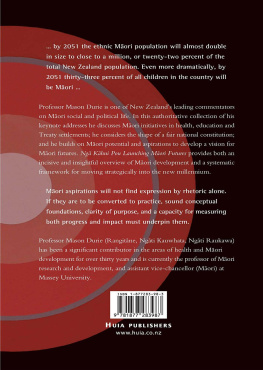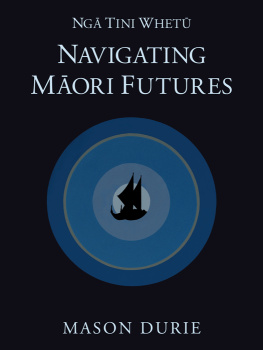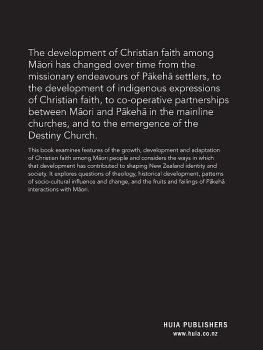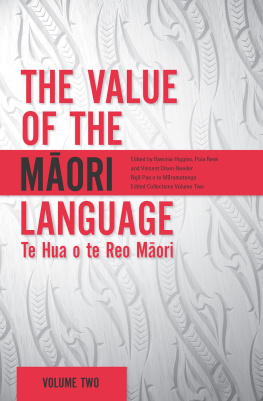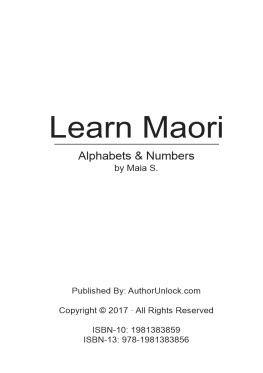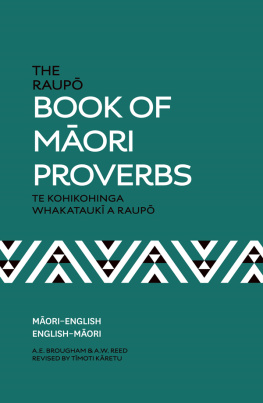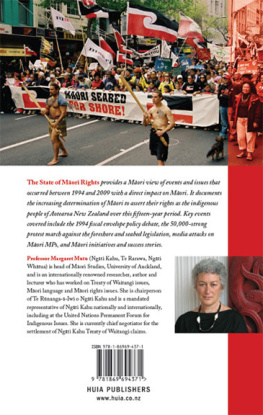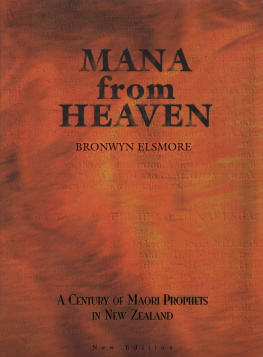Mason Durie - Nga Kahui Pou: Launching Maori Futures
Here you can read online Mason Durie - Nga Kahui Pou: Launching Maori Futures full text of the book (entire story) in english for free. Download pdf and epub, get meaning, cover and reviews about this ebook. publisher: Huia (NZ) Ltd, genre: Politics. Description of the work, (preface) as well as reviews are available. Best literature library LitArk.com created for fans of good reading and offers a wide selection of genres:
Romance novel
Science fiction
Adventure
Detective
Science
History
Home and family
Prose
Art
Politics
Computer
Non-fiction
Religion
Business
Children
Humor
Choose a favorite category and find really read worthwhile books. Enjoy immersion in the world of imagination, feel the emotions of the characters or learn something new for yourself, make an fascinating discovery.
- Book:Nga Kahui Pou: Launching Maori Futures
- Author:
- Publisher:Huia (NZ) Ltd
- Genre:
- Rating:4 / 5
- Favourites:Add to favourites
- Your mark:
- 80
- 1
- 2
- 3
- 4
- 5
Nga Kahui Pou: Launching Maori Futures: summary, description and annotation
We offer to read an annotation, description, summary or preface (depends on what the author of the book "Nga Kahui Pou: Launching Maori Futures" wrote himself). If you haven't found the necessary information about the book — write in the comments, we will try to find it.
Nga Kahui Pou: Launching Maori Futures — read online for free the complete book (whole text) full work
Below is the text of the book, divided by pages. System saving the place of the last page read, allows you to conveniently read the book "Nga Kahui Pou: Launching Maori Futures" online for free, without having to search again every time where you left off. Put a bookmark, and you can go to the page where you finished reading at any time.
Font size:
Interval:
Bookmark:
First published in 2003 by Huia Publishers,
39 Pipitea Street, PO Box 17-335,
Wellington, Aotearoa New Zealand.
www.huia.co.nz
ISBN 978-1-877283-98-7 (Print)
ISBN 978-1-775500-51-3 (EPUB)
ISBN 978-1-775500-58-2 (Mobi)
Copyright Mason Durie 2003
All rights reserved. No part of this publication may be reproduced, stored in a retrieval system, or transmitted in any form or by any means, electronic, mechanical, including photocopying, recording or otherwise, without prior permission of the publisher.
National Library of New Zealand Cataloguing-in-Publication Data
Durie, Mason.
Ng khui pou: launching Mori futures/Mason Durie.
Includes bibliographical references and index.
ISBN 1-877283-98-3
1. Maori (New Zealand people)Social conditions. 2. Maori (New Zealand people)Health and hygiene. 3. Maori (New Zealand people)Economic conditions. 4. Maori (New Zealand people)
Education. I. Title.
305.8999442dc 21
Cover image: Shane Cotton, Aria 2003, acrylic on canvas, 1600 x 3200 mm.
Collection of the artist, courtesy of Hamish McKay Gallery, Wellington.
Photograph by Michael Roth, provided courtesy of City Gallery, Wellington.
Ebook production 2012 by meBooks
Tn koutou
Ng Khui Pou is shaped entirely around a series of addresses given at various conferences, seminars and hui. Some of the addresses were delivered to predominately Mori audiences, others to professional and sectoral groups, and still others to wider international participants from very diverse backgrounds. It is no easy task to bring together people from various persuasions and to create an agenda that can recognise multiple interests, albeit around a central theme.
In that regard I particularly wish to acknowledge the following groups who invited the speakers, managed the conferences, and ensured that the gatherings were well run, hospitable and fruitful:
The Ministry of Health
The Auckland Medical Historical Society
The School of Mori Studies, Massey University
The New Zealand Association of Counsellors
The Foundation for Indigenous Research in Science and Technology (FIRST)
The Department of Psychology, Victoria University
The Mori Public Servants Association
The Steering Committee for the Building the Constitution conference
The Canadian Study of Parliament Group
The New Zealand Faculty of Child and Adolescent Psychiatry
The Royal Australian and New Zealand College of Psychiatrists
The School of Mori and Pacific Development, Waikato University
Te Rnanga o Ngi Tahu
The Diabetes Association of New Zealand
Ngti Twharetoa
The Ministry of Education
The NZ Institute of Environmental Health
Maunga T Maunga Ora (Taranaki Mori Business Group)
The Dean of Law, Victoria University
The Pacific Region Indigenous Doctors Conference Organising Committee
Career Services NZ
The Development Studies Network (Devnet)
Some of the chapters have already been published as papers in journals, books, and conference proceedings and permission to include them in Ng Khui Pou (with some amendments) is gratefully acknowledged.
I am grateful as well to Huia Publishers for their encouragement, assistance and tolerance. Without their energies, this book would have never eventuated.
My sincere thanks must also go to friends and associates from academic, iwi, professional and community walks of life for advice, constructive criticism and innovative ideas, particularly colleagues from the School of Mori Studies and the Office of the Assistant Vice-Chancellor (Mori) at Massey University. Finally I especially wish to acknowledge my wife and family for their never-ending patience and support which has made it possible to participate in such wide range of conferences over the years.
Noho ora mai
Ng Khui Pou: Launching Mori Futures contains a series of addresses delivered between 1999 and 2002 at national and international conferences. They span a range of topics but are brought together by a common thread woven around contemporary Mori development and the advancement of Mori into the twenty-first century. At the same time, although the emphasis in this book is clearly on modern times and the future, Mori development itself is part of a much older journey initiated in Te Moananui a Kiwa, the Pacific, and continued within Aotearoa New Zealand over a period of several centuries or more. Development is not the prerogative of a single era.
Nonetheless Mori development has come to refer to Mori economic, social and cultural advancement in modern times. Positive Mori development certainly emerged as the core of Mori policy in 1984 after the Hui Taumata, the Mori Economic Summit. The new direction was part of the wider manifesto of the fourth Labour government to reduce the size of the State and devolve functions and accountabilities to the private sector as well as to communities. However, it also coincided with Mori aspirations for greater autonomy, revitalisation of culture and language, and a more direct role in delivering services to Mori.
After the upheavals of the nineteenth century, when depopulation and alienation combined to place survival at risk, Mori had become increasingly dependant on a state that was essentially committed to policies and programmes that would assimilate Mori into the prevailing systems of colonial New Zealand. So it remained, virtually until 1975 when the Treaty of Waitangi Act was passed. Although the Act was primarily about establishing a pathway that could lead to the resolution of grievances against the Crown for breaches of the Treaty, it marked the beginning of a new era in New Zealand constitutional and political reform. The Crown now appeared more serious about recognising Mori as a partner in the ongoing development of the nation and Mori were even more determined to live as Mori.
The new era did not arise in isolation of events elsewhere in the world. While New Zealand was grappling with the relevance of an 1840 Treaty to modern times, indigenous people around the globe, including Mori, were debating strategies for undoing the shackles of colonisation, and asserting their rights as First Nations peoples in countries where their standing had been seriously eroded. They engaged in actions at several levels and loss of life, imprisonment, and further marginalisation were not infrequent. But their determination was so unswerving and their collective action so compelling, that the politics of indigeneity were eventually to find a place on agenda of the United Nations and the schedules of many governments.
Meanwhile, having more or less accepted the right of Mori to maintain their own language, culture and social institutions, and having recognised some of the injustices of the past particularly as they applied to the alienation of land and other resources the New Zealand State embarked on a process of reformation. Frequently the reformation process highlighted differences between Mori and the State; often the debate was both acrimonious and confusing, and at times the goals seemed so incompatible that the prospects of any agreement dimmed as the debate progressed. Yet since 1975 the New Zealand ethos has changed. The debate is now less about whether the Treaty of Waitangi should be recognised but how it might be best implemented. There is little discussion about the rights and wrongs of having Mori providers in health or early childhood education or social services, instead the focus is on building their capacity so they might be more effective. Restitution for the glaring injustices of the past is no longer argued as if it were a matter for state generosity, instead it is seen as a state obligation, consistent with common law and with solemn undertakings made in 1840.
Font size:
Interval:
Bookmark:
Similar books «Nga Kahui Pou: Launching Maori Futures»
Look at similar books to Nga Kahui Pou: Launching Maori Futures. We have selected literature similar in name and meaning in the hope of providing readers with more options to find new, interesting, not yet read works.
Discussion, reviews of the book Nga Kahui Pou: Launching Maori Futures and just readers' own opinions. Leave your comments, write what you think about the work, its meaning or the main characters. Specify what exactly you liked and what you didn't like, and why you think so.

